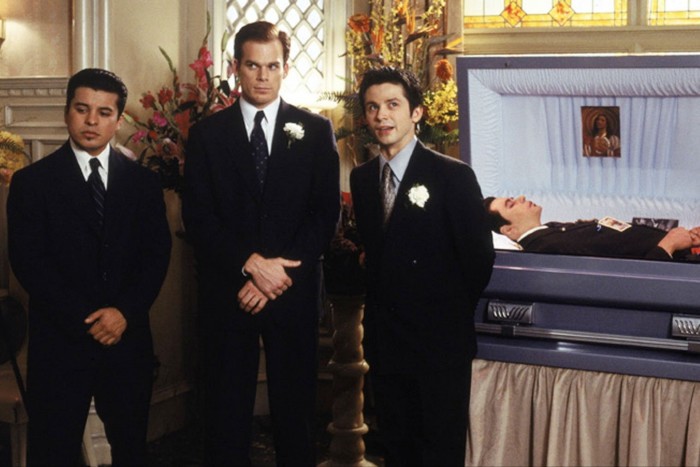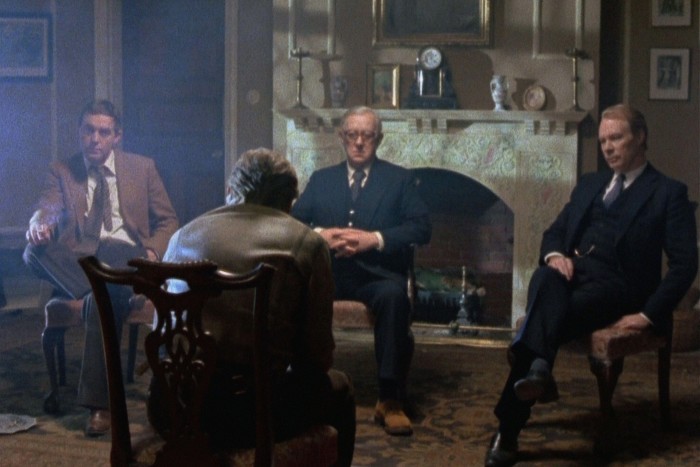Stay informed with free updates
Simply sign up to the Life & Arts myFT Digest — delivered directly to your inbox.
I’m safe at last. Belatedly, I have started reading Mick Herron’s Slough House spy thrillers, and have been devouring them at a rate of knots, for two reasons. The first is that they are very good indeed. The second is, given that the first of the series came out a decade and a half ago, and that the first episode of Slow Horses, the television adaptation, is now two years old, I was at continual risk of having key details spoiled for me if I clicked on the wrong link or happened upon the wrong workplace conversation. Now I am beyond the reach of the adaptations, I can take my time: or, at least, I can read them without fear of spoilers.
The Slough House novels are particularly dangerous because they are good enough that people want to talk about them afterwards, but a central part of the enjoyment, the first time around, is not knowing what will happen next. Enjoyable well-made trash, like the later Ripley novels, can be fun reads but the chances of anyone wanting to talk about it at length afterwards are essentially zero.
In general, I think people are often too reluctant to admit that they have arrived late to a party, which is part of why many of the true greats — Beethoven, Austen, McCartney, Shakespeare, Davis — are in fact underrated, because no one likes to admit that they have only just discovered Kind of Blue or King Lear. One undoubted downside is that the later you discover something, the more likely you are to have happened upon a dreaded “spoiler”: you know that Darcy is not the grouch he seems to be, or that Hamlet dies at the end. The problem is present in low culture as much as high: if you have managed to avoid finding out where Planet of the Apes is set or who Luke Skywalker’s father is, I can only assume that you have been living in a nuclear bunker.
But because an enduring classic can survive a spoiler — I’ve read Tinker Tailor Soldier Spy many times since finding out who the mole is, replayed the video game Disco Elysium since finding out what Harry’s problem is, and rewatched Six Feet Under despite knowing what happens to the Fishers at the end — a sort of snobbery has built around the concept that something can be “spoiled”: that if your enjoyment can be diminished or lessened by knowing what happens next, the story wasn’t much good to begin with. (The latest row, as it happens, concerns the New York Times making the unorthodox choice to illustrate a story about the recent remake of the Final Fantasy VII video game with a picture of the major death that occurs at the end of its first act.)


There’s a half-truth here, which is that a piece of disposable schlock, like Bad Times at the El Royale, a pacy thriller about a sinister hotel starring Jon Hamm, does not reward a second go-around. Something like the Alec Guinness version of Tinker Tailor is still delighting viewers nearly half a century on, even though we know how it ends. Hamm’s 140-minute caper has vanished off the map a few years on, because once you know the twists, there is not much there. But as a rule it misses more than it captures. When you’re in the mood for a one-and-done bit of hokey escapism, if you’re on a long flight, or just need to relax, you will be well served by Bad Times at the El Royale and it would be cruel of me to spoil it for you.
The irritation at having to talk coyly about something you’ve enjoyed is understandable, although I am more sympathetic to it now that I am several books ahead of the Slow Horses series than I was when I feared that the wrong Instagram advert might spoil my fun. Social media means that what 1990s Usenet users dubbed “the eternal September” — the experience of continually having to integrate new arrivals who don’t know the rules into an online community — is essentially inescapable everywhere. (I found myself having to self-censor about the ending of The Sopranos in the office the other day.)
There’s always a market for pseudo-sophisticated takes about why shouting your mouth off about any topic at any time, without regard for anyone who might be listening, is in fact a sign of worldly savvy. The reality is that spoiler warnings are simple politeness, and anyone wanting to talk freely about a story should do what I do: send unsolicited and unwanted WhatsApp messages to the people I know who have already finished the tale in question.
Find out about our latest stories first — follow @FTWeekend on Instagram and X, and subscribe to our podcast Life & Art wherever you listen








